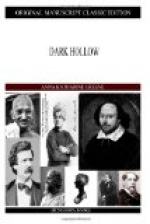Beaten, beaten by a direct assault, because she possessed the weaknesses, as well as the pluck, of a woman. She could control the language of her lips, but not their quivering; she could meet his eye with steady assurance but she could not keep the pallor from her cheeks or subdue the evidences of her heart’s turmoil. Her pitiful glance acknowledged her defeat, which she already saw mirrored in his eyes.
Taking it for an answer, he said gently enough:
“That we may understand each other at once, I will mention the person who has been made the subject of these attacks. He—”
“Don’t speak the name,” she prayed, leaning forward and laying her gloved hand upon his sleeve. “It is not necessary. The whole thing is an outrage.”
“Of course,” he echoed, with some of his natural brusqueness, “and the rankest folly. But to some follies we have to pay attention, and I fear that we shall have to pay attention to this one if only for your daughter Reuther’s sake. You cannot wish her to become the butt of these scandalous attempts?”
“No, no.” The words escaped her before she realised that in their utterance she had given up irretrievably her secret.
“You consider them scandalous?”
“Most scandalous,” she emphatically returned, with a vivacity and seeming candour such as he had seldom seen equalled even on the witness-stand.
His admiration was quite evident. It did not prevent him, however, from asking quite abruptly:
“In what shape and by what means did this communication reach you?”
“I found it lying on the walk between the gates.”
“The same by which Judge Ostrander leaves the house?”
“Yes,” came in faint reply.
“I see that you share my fears. If one such scrap can be thrown over the fence, why shouldn’t another be? Men who indulge themselves in writing anonymous accusations seldom limit themselves to one effusion. I will stake my word that the judge has found more than one on his lawn.”
She could not have responded if she would; her mouth was dry, her tongue half paralysed. What was coming? The glint in the lawyer’s eye forewarned her that something scarcely in consonance with her hopes and wishes might be expected.
“The judge has seen and read these barefaced insinuations against his son and has not turned this whole town topsy-turvy! What are we to think of that? A lion does not stop to meditate; he springs. And Archibald Ostrander has the nature of a lion. There is nothing of the fox or even of the tiger in him. Mrs. Scoville, this is a very serious matter. I do not wonder that you are a trifle overwhelmed by the results of your ill-considered investigations.”
“Does the town know? Has the thing become a scandal—a byword? Miss Weeks gave no proof of ever having heard one word of this dreadful not-to-be-foreseen business.”




